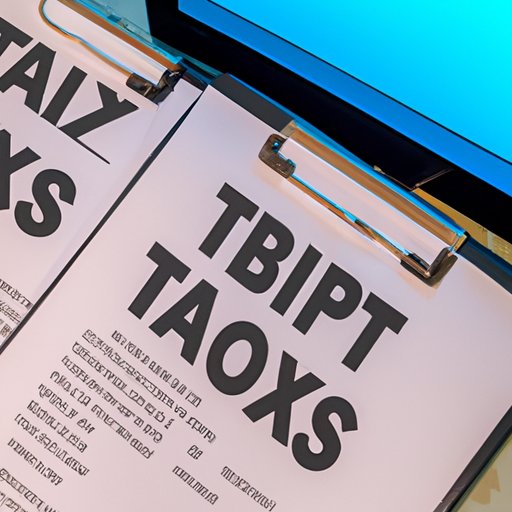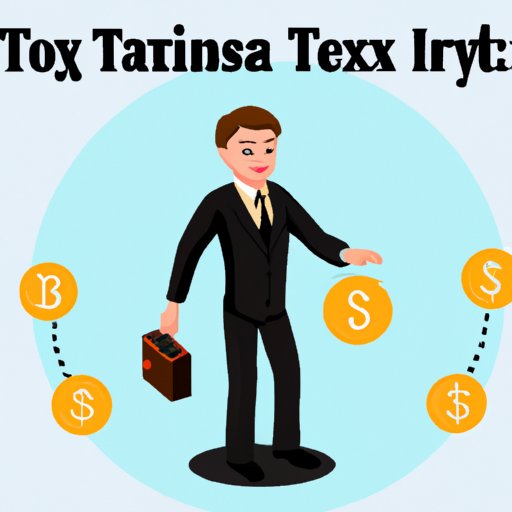Introduction
Cryptocurrency has become a popular way to invest and trade in recent years. It’s an exciting new form of digital money that can be used to purchase goods and services, trade on exchanges, and even speculate on the value of certain coins. But like all forms of income, crypto is subject to taxation in many jurisdictions.
In this article, we’ll explore the different types of crypto taxation, how to determine your taxable gains and losses, and essential tips for investors. We’ll also look at the various regulations in different countries, as well as how to report your crypto profits on your taxes.
Exploring the Tax Implications of Crypto Currency Trading
The first step in understanding crypto taxation is to know what type of taxes you may be liable for. Generally speaking, there are three main types: capital gains tax, income tax, and sales tax. Capital gains tax is applied when you sell a crypto asset for more than you paid for it. Income tax is applied to any profits from crypto trading activities, such as mining or staking. Finally, sales tax is applied when you use a crypto asset to purchase goods or services.
It’s important to understand that not all crypto transactions are considered taxable events. For example, if you simply hold a cryptocurrency without trading it, then it is not subject to taxation. Similarly, if you transfer funds between wallets without exchanging them for fiat currency, then no taxes are due.
However, when you do buy or sell cryptocurrencies, they are subject to taxation. The key question is: what is considered a “trade”? Generally speaking, a trade occurs when someone buys or sells a cryptocurrency for fiat currency, or exchanges one crypto for another.
Once you have identified which trades are taxable, you will need to figure out how much you owe in taxes. This is done by calculating your taxable gains and losses. Gains are calculated by subtracting the cost basis (the amount you paid for the coin) from the sale price. Losses are calculated by subtracting the sale price from the cost basis.

A Guide to Crypto Tax Laws for Investors
The tax implications of crypto vary depending on where you live. In the United States, the IRS considers crypto to be a property, meaning that capital gains tax applies to any profits you make from trading it. This means that long-term holders may benefit from lower tax rates, while short-term traders may be subject to higher taxes.
In Europe, the rules are slightly different. Some countries have adopted a “taxation by activity” approach, where profits from cryptocurrency trading are taxed as income. Other countries have adopted a “taxation by holding” approach, where profits from long-term holdings are taxed as capital gains.
There are also some tax incentives available for long-term holders. For example, in the UK, investors can claim up to 50% tax relief on profits from cryptocurrency investments held for more than 12 months. This means that when you sell a crypto asset that you’ve held for more than a year, you only pay half the normal rate of capital gains tax.
For short-term traders, the tax implications can be more complicated. Depending on the country, you may be subject to income tax, capital gains tax, or both. It’s important to understand your local laws and regulations so that you can accurately report your crypto profits on your taxes.

How to Report Your Crypto Currency Profits on Your Taxes
Once you have identified your taxable trades, you will need to declare your income from crypto trading on your taxes. This involves keeping detailed records of all your transactions, including the date, type of transaction, cost basis, and sale price. You should also keep track of any fees associated with your trades and any other relevant details.
These records will help you accurately report your profits and losses on your taxes. You can use online tools such as CryptoTaxCalculator.com to easily calculate your taxable gains and losses, as well as any applicable taxes. Once you have all the necessary information, you can file your taxes with your local tax authority.

The Tax Man Cometh: Essential Tips for Crypto Currency Investors
Cryptocurrency taxation can be complex, so it’s important to understand your obligations before investing. Here are some essential tips for crypto currency investors:
- Understand the Tax Rules: Make sure you understand the tax rules in your jurisdiction so that you can accurately report your profits and losses.
- Calculate Your Tax Burden: Use online tools to calculate your taxable gains and losses, and get professional help if necessary.
- Take Advantage of Tax Incentives: Look for tax incentives in your jurisdiction, such as long-term capital gains tax relief.
- Know When to Take a Loss: If you incur losses from trading, you can use them to offset your taxable gains.
Cryptocurrency Taxation: What You Need to Know Before Investing
Cryptocurrency taxation is an important consideration for investors. Understanding the tax rules in your jurisdiction, calculating your tax burden, and taking advantage of tax incentives can help you maximize your returns. Finally, make sure to keep detailed records of all your transactions, so that you can accurately report your profits and losses on your taxes.
Conclusion
Cryptocurrency is an exciting new form of digital money, but it is also subject to taxation in many countries. Knowing when crypto is taxable, how to calculate your taxes, and essential tips for investors can help you make informed decisions when trading or investing in crypto assets. By understanding the tax rules and taking advantage of tax incentives, you can maximize your returns and minimize your tax burden.
(Note: Is this article not meeting your expectations? Do you have knowledge or insights to share? Unlock new opportunities and expand your reach by joining our authors team. Click Registration to join us and share your expertise with our readers.)
